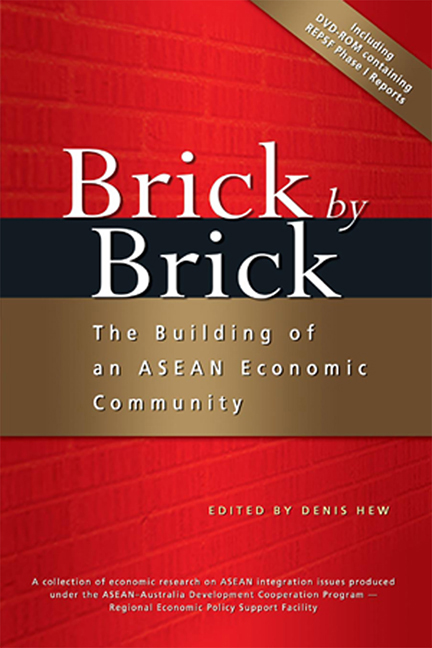Book contents
- Frontmatter
- Contents
- Foreword by Ong Keng Yong
- Foreword by Bruce Davis
- Acknowledgements by Academic Editor
- Acknowledgements by Technical Director REPSF
- The Contributors
- The Regional Economic Policy Support Facility
- 1 Introduction: Brick by Brick — The Building of an ASEAN Economic Community
- 2 What is a Single Market? An Application to the Case of ASEAN
- 3 The Challenge of Economic Integration for Transitional Economies of Southeast Asia
- 4 A Review of Regional Tariffs and Trade in the ASEAN Priority Goods Sectors
- 5 Non-tariff Barriers to Trade in the ASEAN Priority Goods Sectors
- 6 An Assessment of ASEAN's Priority Sectors for Fast-track Integration
- 7 ASEAN Tax Regimes: Impediment or Pathway to Greater Integration
- 8 An Overview of the Foreign Direct Investment Jurisprudence
- 9 ASEAN's FTA Negotiations with Dialogue Partners:Identifying Strengths and Weaknesses in Business Opportunities
- 10 Conclusion: Towards an ASEAN Economic Community by 2015
- Index
- Contents of Accompanying CD-ROM: AADCP-REPSF Phase I Research Program
7 - ASEAN Tax Regimes: Impediment or Pathway to Greater Integration
Published online by Cambridge University Press: 21 October 2015
- Frontmatter
- Contents
- Foreword by Ong Keng Yong
- Foreword by Bruce Davis
- Acknowledgements by Academic Editor
- Acknowledgements by Technical Director REPSF
- The Contributors
- The Regional Economic Policy Support Facility
- 1 Introduction: Brick by Brick — The Building of an ASEAN Economic Community
- 2 What is a Single Market? An Application to the Case of ASEAN
- 3 The Challenge of Economic Integration for Transitional Economies of Southeast Asia
- 4 A Review of Regional Tariffs and Trade in the ASEAN Priority Goods Sectors
- 5 Non-tariff Barriers to Trade in the ASEAN Priority Goods Sectors
- 6 An Assessment of ASEAN's Priority Sectors for Fast-track Integration
- 7 ASEAN Tax Regimes: Impediment or Pathway to Greater Integration
- 8 An Overview of the Foreign Direct Investment Jurisprudence
- 9 ASEAN's FTA Negotiations with Dialogue Partners:Identifying Strengths and Weaknesses in Business Opportunities
- 10 Conclusion: Towards an ASEAN Economic Community by 2015
- Index
- Contents of Accompanying CD-ROM: AADCP-REPSF Phase I Research Program
Summary
Introduction
Taxation has the potential to either impede or become one of the pathways to greater integration and economic growth within ASEAN. Taxation is only one of many considerations made by businesses in making investment decisions; other factors such as transparency, supply chains, labour force, and markets are clearly important to investment decisions, but taxation is clearly a key factor that must be considered.
ASEAN aims to become a more integrated economic entity, in many ways similar to the multi-nation model of the European Union. This economic community objective, with a specific focus on designated priority sectors, was detailed in the Vientiane Action Plan agreed by ASEAN in late 2004. While there has been considerable progress across a wide range of policy areas to enhance integration, taxation is a policy area in which progress has to date been more protracted.
Double Tax Agreements between ASEAN Member Countries
Double Taxation Agreements (DTAs), as the term suggests, are treaties between states that aim to avoid double taxation and prevent fiscal evasion. DTAs seek to resolve conflicts between states with respect to the income tax liability of taxpayers operating across jurisdictions. DTAs also provide mechanisms for cooperative action to prevent fiscal evasion.
The DTA issue for ASEAN is that while many ASEAN member countries (AMCs) have bilateral tax treaty arrangements, both within ASEAN and with non-ASEAN economies, none have comprehensive tax treaty coverage across all the other AMCs. The typical DTA coverage by each AMC is often limited to just over half the other AMCs. Some AMCs also have very limited treaty networks, specifically Brunei Darussalam, Cambodia, Lao PDR, and Myanmar.
A limited DTA network within ASEAN is an impediment to regional economic integration and development because it increases business tax costs, imposes administrative burdens, creates transaction uncertainties, and provides a general disincentive to regional investment and profit repatriation.
The “age” of the ASEAN DTA network is also a salient issue. The average ASEAN DTA is between ten and fifteen years old. This may also be considered an impediment to cross-border investment because AMC fiscal and regulatory reform has overtaken DTA terms — making many DTAs de facto obsolete. In addition, economic and technological changes over the last decade have created “new income” unable to be readily characterized under some DTAs.
- Type
- Chapter
- Information
- Brick by BrickThe Building of an ASEAN Economic Community, pp. 132 - 143Publisher: ISEAS–Yusof Ishak InstitutePrint publication year: 2007

